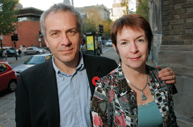Social conscience
Leaders in research and policy to take School of Social Work in new direction

Nico Trocmé and Wendy Thomson plan to revitalize the School of Social Work.
Owen Egan
On the surface, new arrivals Wendy Thomson and Nico Trocmé seem unlikely allies. Although they've both ended up in the same place — McGill's School of Social Work — they've taken decidedly different paths to get here.
Thomson, the school's new director, knows this place very well, having earned both her BSW and MSW here in the 1970s. Between then and now, Thomson has spent the last 20 years working at various levels of British government, including acting as Prime Minister Tony Blair's advisor on public service reform and making a name for herself as an expert on social policy.
Trocmé, McGill's new Philip Fisher Chair in Social Work and the Scientific Director of the Centre of Excellence for Child Welfare, was raised in France. In 1977, he chose to pursue an undergraduate degree in philosophy at the University of Toronto instead of McGill because Quebec's political climate of the time seemed, in his own words, "troubled." But much has changed since then — provincial politics have stabilized to the point of banality and Trocmé, the former philosophy student, has become a world-renowned expert on child welfare.
But this unlikely pairing of policy pro and researcher par excellence may not be so strange. In the end, both share the common goals of revitalizing the School of Social Work and of training the professionals who will shape society.
Thomson knows firsthand the obstacles one faces when trying to bring about meaningful change. Perhaps her most formidable task in Britain — some would say downright Sisyphean — was her work on modernizing some of that country's oldest public services, including higher education. The experience has given her considerable appreciation for the strengths, and weaknesses, of universities.
Bolstering the school's finances is one of Thomson's priorities. For example, the school has a number of special programs, including certificates in Northern Social Work and Aboriginal Social Work, whose government funding has run out. "The challenge for us is to continue to serve these communities even though we've lost the dedicated resources," she says. "As someone who was formerly responsible for allocating large public funds, I'm a firm believer that you must demonstrate value for public resources and make the case for greater investment. That is what the school will do."
While she has definite ideas as to what direction the school should take, Thomson isn't about to make changes for change sake. "Other schools in Canada look at McGill with considerable respect because of our expertise in children, couples and family policy and practice," she says. "It would be foolish to undervalue that." Thomson hopes that a renewed sense of purpose will arise from the Future Directions project she has initiated to investigate and address the challenges facing social work and professional education internationally and in Quebec. Plus, the addition of three new professors for next September will increase the school's output and reputation.
As director, Thomson looks to build the school's reputation within McGill, seeing it as a model for other disciplines of how to apply knowledge to tackling social problems, reducing inequality and promoting social justice. Currently she is soliciting the opinions of students, staff and outside social agencies in order to evaluate the school's current position and formulate a plan for the future.
Thomson believes that the future is already brighter with the arrival of Trocmé. "Nico is a great acquisition," says Thomson. "I'm delighted he's here."
If Trocmé's name sounds familiar, that's because he was recently in the national spotlight as the principal investigator of a study that showed reported incidents of child abuse and neglect in Canada had doubled from 1998 to 2003. But without downplaying the significance of his national research, Trocmé admits that one of the aspects of McGill's offer that lured him from Toronto was the chance to have more hands-on interaction at a local level.
"Because of the national scope of my research, I spent more time meeting with deputy ministers and ministers discussing policy," he says. "When you work locally, you can have a broader focus and involve yourself in a different way. Just last week, I spent the morning with the frontline staff at Batshaw Youth and Family Centres discussing research that directly affects their work."
Like Thomson, Trocmé has been spending his early days at McGill studying existing services and discerning how the child welfare centre can be strengthened. His goal is to begin evaluating child welfare services — something that, surprisingly, is rarely done. "Canada spends something like $3.5 billion a year on child welfare services," he says, "but probably no more than $300,000 evaluating them. We have no idea whether this huge effort is actually benefiting the kids."
Ultimately, both Thomson and Trocmé share the same priorities for the School of Social Work. "Particularly in a school like McGill, the pressure to do research is enormous," says Thomson. "But we must always remember that we are developing a legitimate and substantial body of knowledge to support professional and policy practitioners."
Trocmé is even more direct. "We're training professionals to practice," he says. "All our research has to be relevant to the community at large. In the end, the best social services are those that make a difference to the people who need them most."

